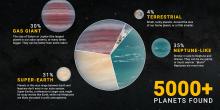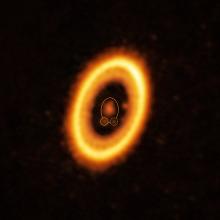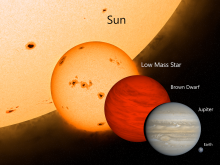Listen to today's episode of StarDate on the web the same day it airs in high-quality streaming audio without any extra ads or announcements. Choose a $8 one-month pass, or listen every day for a year for just $30.
You are here
Rapid Birth
When it comes to making planets, star systems may not waste much time. A recent study says that planets may form in less than a million years — the blink of an eye in the lifetime of a star.
Planets form when bits of debris around a newborn star stick together. Chunks of ice and rock can merge to form bodies the size of Earth or bigger. Bodies that are far away from the star can then sweep up huge amounts of leftover gas and dust. That makes giant planets, such as Jupiter and Saturn in our own solar system.
Observations of star systems that are as young as one million years, though, have shown a dearth of the dust grains needed to make Jupiter-sized planets. That could mean that such systems won’t give birth to giant planets — or that they already have.
In a recent study, astronomers used arrays of radio telescopes in New Mexico and Chile to study especially young star systems in Perseus. The systems are no more than a half-million years old — mere infants. The astronomers found that the systems contain plenty of dust for making planets. That suggests that giant planets can form in a million years or less — the blink of an eye.
Perseus is climbing into the evening sky this month. Tonight, it’s in good view, in the northeast, by about 10:30. It rises a few minutes earlier each night, providing plenty of time to enjoy one of the highlights of the autumn sky.
Tomorrow: a “hot coal” of an exoplanet.
Script by Damond Benningfield






